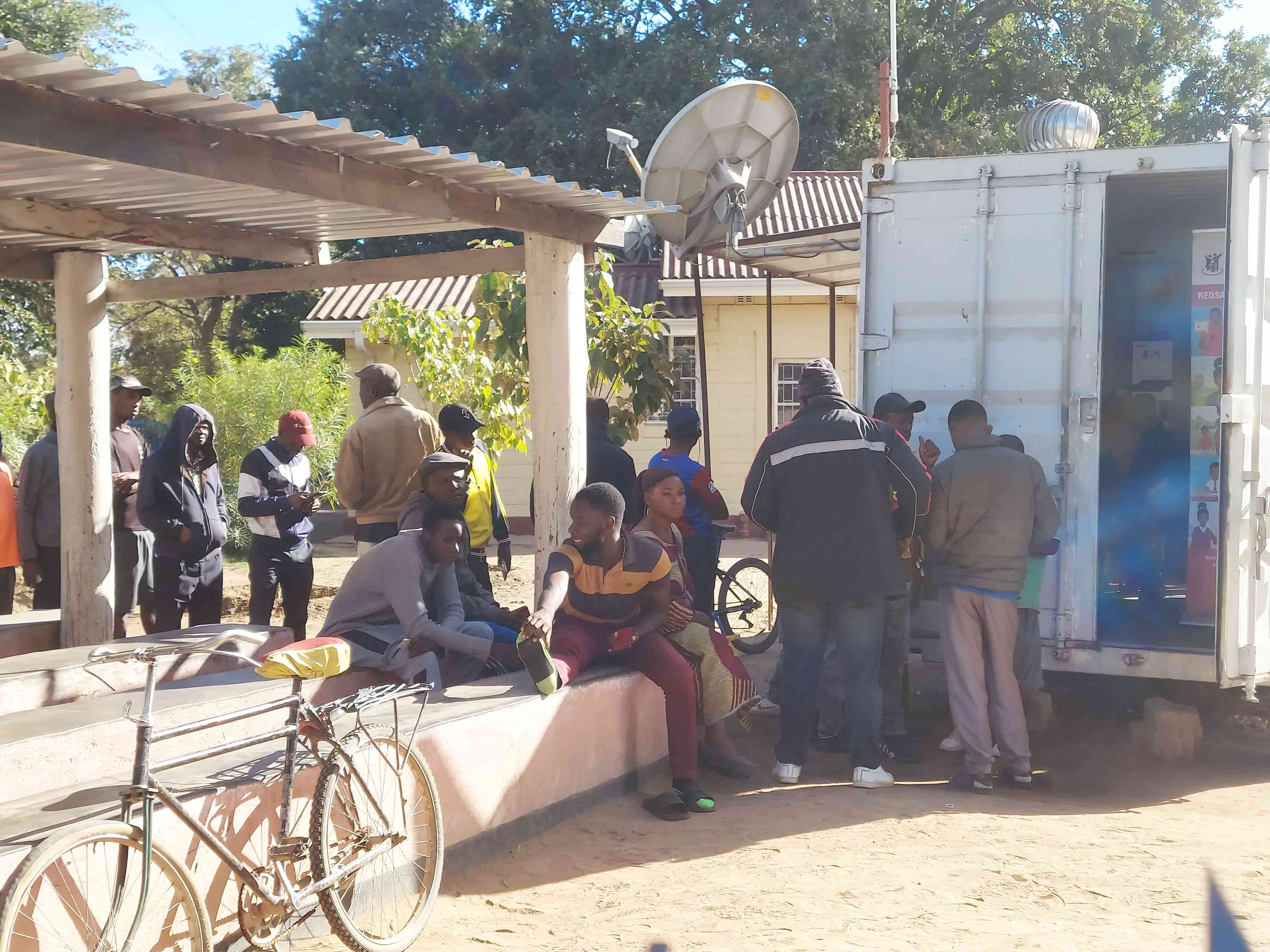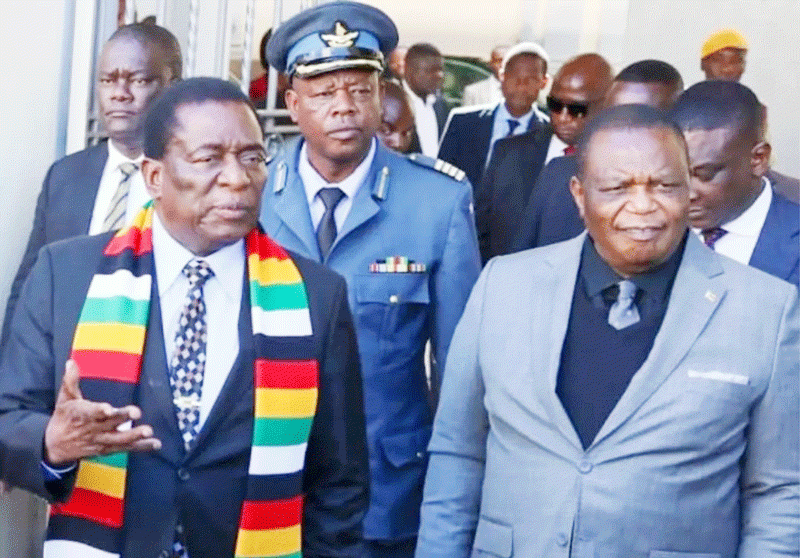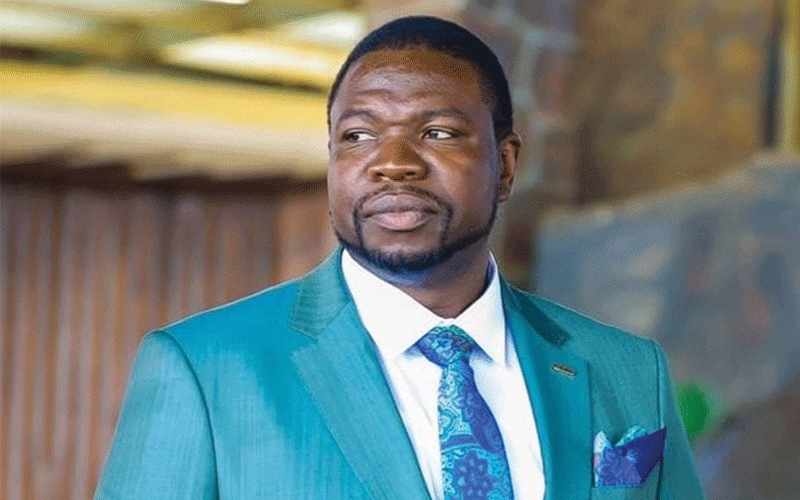
The traumatic experiences that Patience Futila Munongo was exposed to in his village of Villo on the outskirts of Kinshasa in the Democratic Republic of Congo (DRC) after witnessing the torture and killing of his family members cast lingering shadows over his life, haunting him several months after the horrific incident.
Speaking through an interpreter with interludes to allow him to sniff, wipe tears and talk, Munongo said he was separated from his wife of 25 years and his two daughters aged 21 years and 13 years on the night of November 19, 2023 after rebels attacked his village.
He managed to flee, got into a boat to take him to Zambia before boarding a truck, which was heading for Zimbabwe.
“I thank God that I escaped this attack, but I am not sure about my wife,” said a sobbing Munongo.
“I am told my two daughters are alive and are still in the village under the care of a neighbour.”
Munongo said he was making frantic efforts to link up with his wife if she was still alive.
“She might have been killed during the attack on that night or she could have been killed while on transit to a safer place,” he said.
“I am hopeful we will one day meet.
- Congolese rapist freed over prosecution error
- TDH-Italy marks refugee day, pledges more assistance
- Zim hosting 20 000 refugees: Govt
- Govt moves to curb immigration crisis
Keep Reading
“I am keen to talk to my daughters, but l can't because the war is ongoing in the village.”
Munongo is among thousands of refugees and asylum seekers housed at Tongogara Refugee Camp in Chipinge, Manicaland province.
Thirty-seven-year-old Anne Malo recounted how she left her home on her own after rebels pounced on her village of Katoka in Kamanga province in early 2016.
“I don’t even know how I managed to escape on that night,” she said.
“I have never heard from my parents or my other siblings whom I am told managed to flee although we went separate ways.
“It's fortunate that after several years I got to understand that my sisters and a brother were alive.
“In January I managed to reach out to a brother, who managed to flee and is now in France.”
Malo, who has been at Tongogara Refugee Camp since 2016, has started a new life at the camp.
“I have three kids, but unfortunately their father just disappeared,” she said.
“He was also a refugee whom I met in the camp.”
However, she said there were no chances of going back to the DRC.
After going through a distressing experience at the hands of rebels, 23-year-old Dallas Mpoyi Bendele cannot even elucidate his traumatic journey to safety.
“Nearly almost everyone in the village was killed and the three of us including my two friends were captured by the rebels,” Bendele said.
“We were compelled to dig shallow graves and bury our dead relatives.
“A friend refused, and he was shot straight in the head.
“We complied, but we managed to flee at night until we came to Zimbabwe.”
Bendele is working to get registered as a refugee at Tongogara Refugee Camp where he hopes to resume his studies.
“I don’t want to go back to the DRC, but I want to start afresh, get motor mechanic skills and open an automobile business,” he said.
“The authorities are finalising my documentation.”
The trio are part of the 15 836 displaced people at Tongogara Refugee Camp of which 8 759 are refugees and the rest are asylum seekers.
Authorities at the camp said 74% refugees and asylum seekers are from DRC, 11% from Mozambique, 6% from Burundi and 5% from Rwanda.
The remaining 4% come from the Horn of Africa, West and North Africa.
According to the United Nations High Commission for Refugees (UNHCR), it is estimated that globally, over 89.3 million people have been forcibly displaced as a result of war, conflict, persecution and human rights violations.
As such, millions have been separated from their loved ones that prompted the International Committee of Red Cross (ICRC) working with national Red Cross and Red Crescent societies to introduce the restoring of family links programmes to locate people and put them back into contact with their relatives.
The programme includes tracing family members, re-establishing and maintaining contact, reuniting families and seeking to clarify the fate and whereabouts of those who remain missing.
The ICRC also aims to provide long-lasting, multidisciplinary and sustainable support to families and communities forced to deal with the ambiguous loss of missing persons.
For Munongo, Malo and Bendele as well as thousands of refugees and asylum seekers at Tongogara Refugee Camps, the Restoring Family Links programme has brought relief.
“It is only through this facility that I heard that my two daughters were alive in the DRC,” Munongo told The Standard.
“Ever since I came here, I visit the Red Cross facility in order to try to reach out to my relatives.
“Through the Red Cross message facility I managed to send a message to the Red Cross in the DRC, who responded acknowledging that my daughters were still alive.
“However, I could not talk to them because of the war.
“I am still coming to the Red Cross facility with the hope of reaching out to my wife.”
The Zimbabwe Red Cross Society (ZRCS) is implementing the Restoring Family Links programme at Tongogara Refugee Camp, Beitbridge Border Post and Harare’s Roadport regional bus terminus, among other places.
“As part of the global Red Cross Movement, the ZRCS offers the Restoration Family Links programme which seeks to prevent family separation, restore and maintain family contact, reunite families and clarify the fate of missing persons by offering the following services for free: Red Cross messages, Wi-Fi services, tracing of loved ones, phone call services, trace the face, RedSafe mobile app and phone charging,” ZRCS secretary-general Elias Hwenga said.
“The programme is targeting over 15 000 refugees and asylum seekers housed at the Tongogara Refugee Camp, primarily from the Great Lakes Region, who fled conflicts in their home countries.
“Many of these people lost contact with their families due to sudden displacement and lack the means (mainly financial) to re-establish connections.”
According to Hwenga, from January to date, they have had three successful positive tracing outcomes, registered more than 25 tracing cases, distributed 30 000 Wi-Fi tokens, facilitated 538 phone calls, provided 1 440 phone charging sessions, exchanged four Red Cross Messages and downloaded 139 RedSafe applications.
This publication witnessed snake-like queues forming at the Red Cross facility as early as 8am as refugees and asylum seekers sought to reconnect with their loved ones.
“This facility is very helpful to fellow refugees, hence you see them as early as 8am every morning,” said Prince Ngoy Kapalata, one of the Red Cross refugee volunteers manning the Restoring Family Links facility in the camp.
“I was a volunteer under the DRC Red Cross, but we were attacked by rebels during our voluntary work, which forced me to flee with my wife and children.
“I am here to continue with my humanitarian work, helping fellow refugees to reconnect with their loved ones.”
Twenty-four-year-old Jojo Mukuta, another Red Cross refugee volunteer said he was fortunate that he managed to escape alongside his four brothers.
“My four brothers are here in the camp and my father is in the United States,” we were all separated by the war.
“I came into the camp in 2017 and managed to learn English and I am trying to speak Shona with the hope of permanently staying here.
“I am a volunteer here at Red Cross where I help my fellow refugees with the translation, especially in English.”
Mukuta, who speaks Swahili, Lingana, France and English, said his contribution was making an impact to the Restoring Family Links programmes.
“I also do the translation of Red Cross messages and other applications,” he said.
“I hope to settle here in Zimbabwe, move on with my life and possible marry a Zimbabwean.”
For Malo, the Restoring Family Links programme helped her relink with his brother in France.
“After years of separation, I managed to talk to my brother in France as from January this year,” she said.
“He promised to send me money if he settles well in France.
“For now I am getting assistance from the government of Zimbabwe and many organisations like the Red Cross operating here in the camp.”
According to Hwenga, ZRCS provides between 300 and 400 Wi-Fi tokens to refugees per day.
“We give them 30-minute Wi-Fi tokens and three minutes of phone calling per day,” Hwenga said.
“However, we can extent the duration depending on the severity or circumstances of the case.”
Tongogara Refugee Camp administrator Johanne Mhlanga was full of praises of the Restoring Family Links programmes.
“From our side, we are impressed with what the Zimbabwe Red Cross Society is doing to link families separated during conflicts or other misfortunes,” he said.
“It is very critical for the intervention of this nature considering that these people would have been separated with their loved ones.
“It also helps assist to get closure.
“Family restoration is the mandate not only of the Red Cross, but the government.
“We have seen the Red Cross assist the government of Zimbabwe in restoration of family links and this is quite plausible.”
Mhlanga said the Restoring Family Links has a component for unaccompanied minors and separated children.
“We have 73 unaccompanied children and 46 separated children at Tongogara Refugee Camp,” he said.
“Our mandate as the government of Zimbabwe is to make sure that these unaccompanied children and separated children are fully protected in line with refugee and children’s conventions.
“We are happy that organisations like Red Cross are implementing programmes that facilitate the enhancement of children’s rights.”
Specific protection for refugee children is provided in Article 22 of the Convention on the Rights of the Child and Article 23 of the African Charter on the Rights and Welfare of Children.
Munongo said if he was to meet his daughters it would be in safer countries like Zimbabwe or overseas.
“I don’t think I will go back to DRC again,” he said.
“The harrowing night experiences still linger in my mind.”









